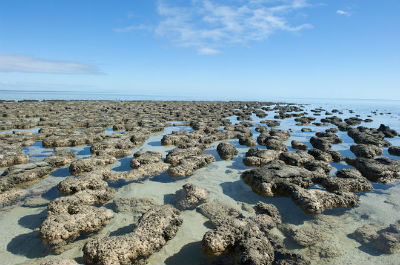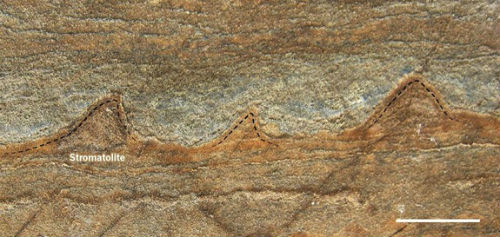 The earliest evidence for life on Earth arises among the oldest rocks still preserved on the planet.
The earliest evidence for life on Earth arises among the oldest rocks still preserved on the planet.
Earth is about 4.5 billion years old, but the oldest rocks still in existence date back to just 4 billion years ago. Not long after that rock record begins, tantalizing evidence of life emerges: A set of filament-like fossils from Australia, reported in the journal Astrobiology in 2013, may be the remains of a microbial mat that might have been extracting energy from sunlight some 3.5 billion years ago. Another contender for world's oldest life is a set of rocks in Greenland that may hold the fossils of 3.7-billion-year-old colonies of cyanobacteria, which form layered structures called stromatolites. Some scientists have claimed to see evidence of life in 3.8-billion-year-old rocks from Akilia Island, Greenland. The researchers first reported in 1996 in the journal Nature that isotopes (forms of an element with different numbers of neutrons) in those rocks might indicate ancient metabolic activity by some mystery microbe.
Those findings have been hotly debated ever since — as, in fact, have all claims of early life. Still, the fact that suggestive evidence of life arises right as the rock record begins raises a question, said University of California, Los Angeles, geochemist Elizabeth Bell in a SETI Talk in February 2016: Is the timing a coincidence, or were there earlier forms of life whose remnants disappeared with the planet's most ancient rocks? 
The period that occurred before the rock record begins is known as the Hadean. It was an extreme time, when asteroids and meteorites pummeled the planet. Bell and her colleagues said they might have evidence that life arose during this very unpleasant time. In 2015, the research team reported discovering graphite, a form of carbon, in 4.1-billion-year-old crystals of zircon. The ratio of isotopes in the graphite suggested a biological origin, Bell and her colleagues wrote in the journal Proceedings of the National Academy of Sciences. "There is some skepticism, which is warranted," Bell told Live Science.
Meteorites or chemical processes might have caused the odd carbon ratios, she said, so the isotopes alone aren't proof of life. Since the publication of the 2015 paper, Bell said, the researchers have found several more of the rare-carbon inclusions, which the scientists hope to analyze soon. From what is known of this period, there would have been liquid water on the planet, Bell told Live Science in an interview. There might have been granite, continental-like crust, though that's controversial, she said. Any life that could have existed would have been a prokaryote (a single-celled organism without membrane-bound nuclei or cell organelles), Bell added. If there was continental crust on Earth at the time, she said, prokaryotes might have had mineral sources of nutrients like phosphorus.
A different approach to the hunt for Earth's early life suggests that oceanic hydrothermal vents may have hosted the first living things. In a paper published in July 2016 in the journal Nature Microbiology, researchers analyzed prokaryotes to find the proteins and genes common to all of these organisms, presumably the final remnants of the Last Universal Common Ancestor (LUCA) — the first shared relative from which all life today descends. The research team found 355 proteins shared by all archaeal and bacterial lineages. Based on those proteins, the researchers reconstructed a view of LUCA's genome, hinting that it lived in an anaerobic (oxygen-free), hydrothermal environment. If that's the case, Earth's first life (or at least the first life that left descendants) would have resembled the microbes that cluster around deep-sea vents today, the researchers said.
Live Science












